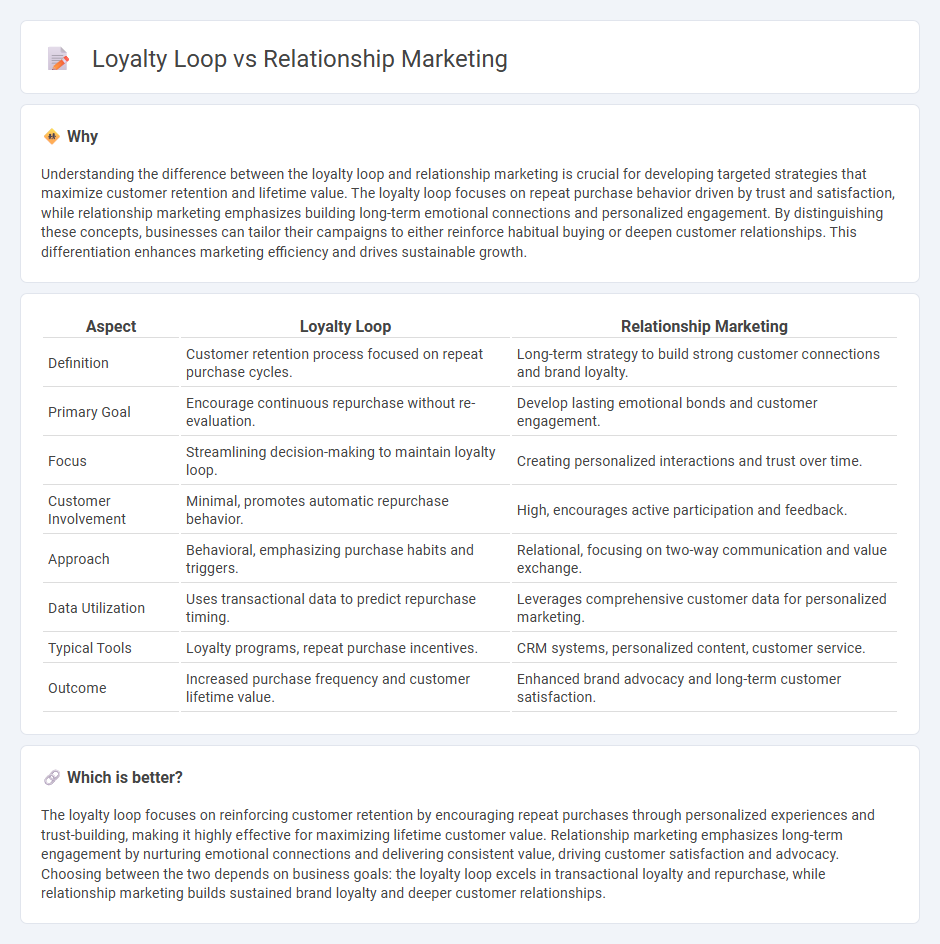
Loyalty loop focuses on creating repeat purchases by reinforcing positive customer experiences and encouraging brand loyalty through targeted engagement strategies. Relationship marketing emphasizes building long-term customer connections using personalized communication and value-driven interactions to foster trust and retention. Explore these approaches to understand how businesses enhance customer lifetime value through different marketing tactics.
Why it is important
Understanding the difference between the loyalty loop and relationship marketing is crucial for developing targeted strategies that maximize customer retention and lifetime value. The loyalty loop focuses on repeat purchase behavior driven by trust and satisfaction, while relationship marketing emphasizes building long-term emotional connections and personalized engagement. By distinguishing these concepts, businesses can tailor their campaigns to either reinforce habitual buying or deepen customer relationships. This differentiation enhances marketing efficiency and drives sustainable growth.
Comparison Table
| Aspect | Loyalty Loop | Relationship Marketing |
|---|---|---|
| Definition | Customer retention process focused on repeat purchase cycles. | Long-term strategy to build strong customer connections and brand loyalty. |
| Primary Goal | Encourage continuous repurchase without re-evaluation. | Develop lasting emotional bonds and customer engagement. |
| Focus | Streamlining decision-making to maintain loyalty loop. | Creating personalized interactions and trust over time. |
| Customer Involvement | Minimal, promotes automatic repurchase behavior. | High, encourages active participation and feedback. |
| Approach | Behavioral, emphasizing purchase habits and triggers. | Relational, focusing on two-way communication and value exchange. |
| Data Utilization | Uses transactional data to predict repurchase timing. | Leverages comprehensive customer data for personalized marketing. |
| Typical Tools | Loyalty programs, repeat purchase incentives. | CRM systems, personalized content, customer service. |
| Outcome | Increased purchase frequency and customer lifetime value. | Enhanced brand advocacy and long-term customer satisfaction. |
Which is better?
The loyalty loop focuses on reinforcing customer retention by encouraging repeat purchases through personalized experiences and trust-building, making it highly effective for maximizing lifetime customer value. Relationship marketing emphasizes long-term engagement by nurturing emotional connections and delivering consistent value, driving customer satisfaction and advocacy. Choosing between the two depends on business goals: the loyalty loop excels in transactional loyalty and repurchase, while relationship marketing builds sustained brand loyalty and deeper customer relationships.
Connection
The loyalty loop focuses on retaining customers by encouraging repeat purchases through exceptional experiences and satisfaction, making it a core element of relationship marketing. Relationship marketing prioritizes building long-term customer connections and trust, which directly supports the creation of a loyalty loop. Both strategies leverage personalized communication and customer insights to enhance retention rates and lifetime customer value.
Key Terms
Relationship Marketing:
Relationship marketing emphasizes building long-term customer connections through personalized communication, trust development, and consistent engagement to foster brand loyalty. It leverages customer data, emotional bonds, and value-added interactions to create sustained satisfaction and repeat business. Explore deeper insights into relationship marketing strategies and their impact on customer retention and business growth.
Customer Engagement
Relationship marketing emphasizes building long-term connections through personalized communication, trust, and consistent value delivery to enhance customer retention and satisfaction. The loyalty loop model centers on leveraging repeat purchase behavior by keeping customers engaged post-purchase to encourage ongoing loyalty and advocacy. Explore more to understand how integrating both strategies maximizes customer engagement and lifetime value.
Long-term Value
Relationship marketing emphasizes building strong, personalized customer connections to enhance long-term value through trust and continuous engagement. The loyalty loop focuses on creating a seamless post-purchase experience that encourages repeat business and reinforces customer retention, ultimately maximizing lifetime value. Explore in-depth strategies to optimize both approaches for sustained business growth.
Source and External Links
What Is Relationship Marketing? - Relationship marketing focuses on customer loyalty and long-term engagement, differing from transactional marketing by prioritizing ongoing relationships over individual sales.
Relationship Marketing: 5 Ways to Create Lifelong Customers - This article discusses five ways to create lifelong customers through relationship marketing, including emotional connections, purpose-driven connections, and customer feedback mechanisms.
What is relationship marketing? Definition, Examples, Levels - Relationship marketing is a long-term strategy that can be divided into stages like establishing initial relationships, developing deeper connections, and becoming committed partners.
 dowidth.com
dowidth.com